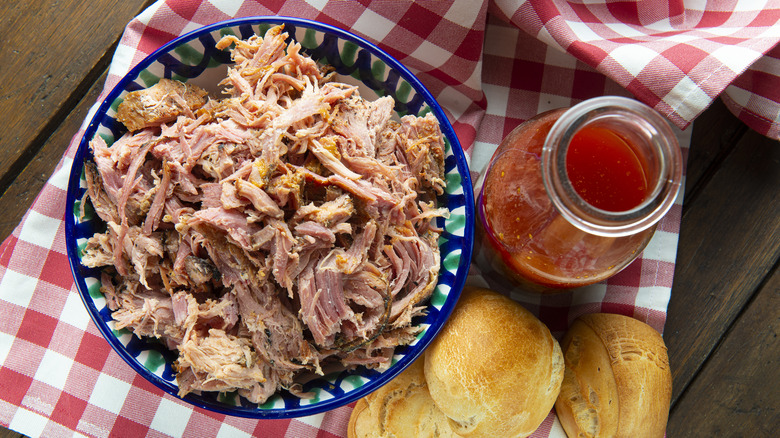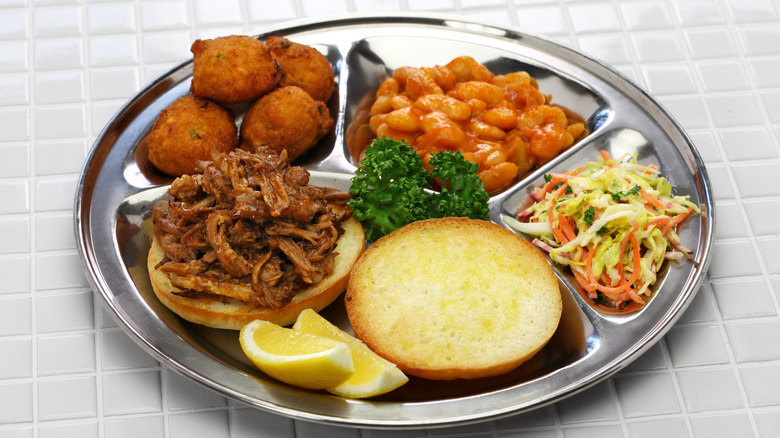What Separates Lexington Dip From North Carolina Barbecue Sauce?
Barbecue is integral to American cuisine, but what the term means depends on which state you're dining in. The cooking practices of barbecue have been popular since the 18th century, and remained relatively uniform across the country until a wave of regional differences emerged in the 20th century. While every style of American barbecue has its nuances, the sauce most obviously defines them. Go-to BBQ condiments range from thick and sweet to thin and tangy, and you usually have to cross state lines to try more than one — but in North Carolina, you get a two-for-one deal.
In the eastern part of the state, spicy, vinegar-based sauce slathered on barbecued pork reigns supreme. Made by combining a few simple ingredients with cider vinegar, North Carolina barbecue sauce bears no resemblance to the thick, sweet sauces that many other Americans usually associate with the cuisine. It allows the flavors of the painstakingly-prepared meat to take center stage.
Meanwhile, Lexington dip, which levels up this simple vinegar sauce with a bit of ketchup, is preferred in the western part of the state. Although sweeter than the sauces preferred out East, it doesn't come close to the nationally-recognized Kansas City barbecue sauce, which is thick and sugary with molasses and spices. The punchy vinegar through-line in both of these sauces means that wherever you are in NC, you'll get enjoy a tangy condiment that mostly lets the meat do the talking.
North Carolina barbecue sauce is the OG
By most accounts, the vinegar sauce enjoyed in eastern North Carolina is the godfather of American barbecue sauce – the one all regional variations can be traced back to. The area's barbecue culture takes from Native American, Taino (indigenous Caribbean), and African culinary traditions that blended together through the transatlantic slave trade. Meant to emulate the Taino and Native American styles of cooking experienced by European colonizers, enslaved peoples in eastern NC used ingredients that were readily available to produce fire-roasted meats.
As for the influence from Africa, lemons and limes were originally used to season barbecued meat, but were harder to come by in the States. Vinegar, which had long been employed by the British as a basting liquid, was used instead. African hot peppers were swapped for dried red pepper flakes, cayenne pepper, and black pepper, and plenty of salt was added as well.
By the 1800s, North Carolina barbecue sauce was a popular condiment, with recipes appearing in multiple cookbooks. Thin, sharp, and spicy, it's perfect for accentuating the smoky notes of meat while also tenderizing it with the vinegar's acid. Its simplicity also left plenty of room for pit masters to experiment, which resulted in Lexington dip.
Lexington dip's regional divergence
Lexington dip, also called Western North Carolina or Piedmont-style barbecue sauce, emerged sometime around the early 1900s, and was heavily influenced by German settlers and the release of Heinz ketchup. Since sweet and tangy pork shoulder was a familiar Bavarian dish, Pennsylvania Dutch men with German roots set out to fuse the North Carolina cuisine they'd grown up eating with the culinary traditions of their mother country — and it was a huge hit.
Rather than having to use a whole hog, which is favored in conventional North Carolina barbecue, pork shoulder became widely available, likely due to advances in the meat curing and packing industries. The state's traditional barbecue sauce was doctored with just enough Heinz ketchup to bring sweetness and body, which inspired nostalgia in the German population. While vinegar sauce is used to baste the meat and add flavor throughout cooking, Lexington dip is brushed on later in the process to avoid burning the sugar on the grill, acting more like a topping or dip than a basting sauce.
Though an East versus West rivalry does exist, both Lexington dip and North Carolina barbecue sauce share the same foundational ingredients, and beautifully demonstrate how deliciously a vinegar-based sauce can highlight the flavors of slow-cooked meats. Try them both to learn whether you prefer the acidic force of the original, or like things slightly sweeter.



